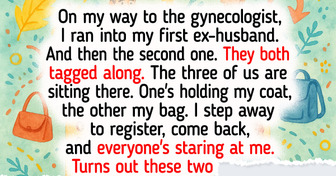They can always change the will. And there may not be anything left. While they are alive have them add you to the deed and any accounts so you will be the automatic beneficiary. Don't give up your whole life for them - assist them in hiring a paid caregiver.
I Will Never Take Care of My Aging Parents Until They Follow My One Golden Rule
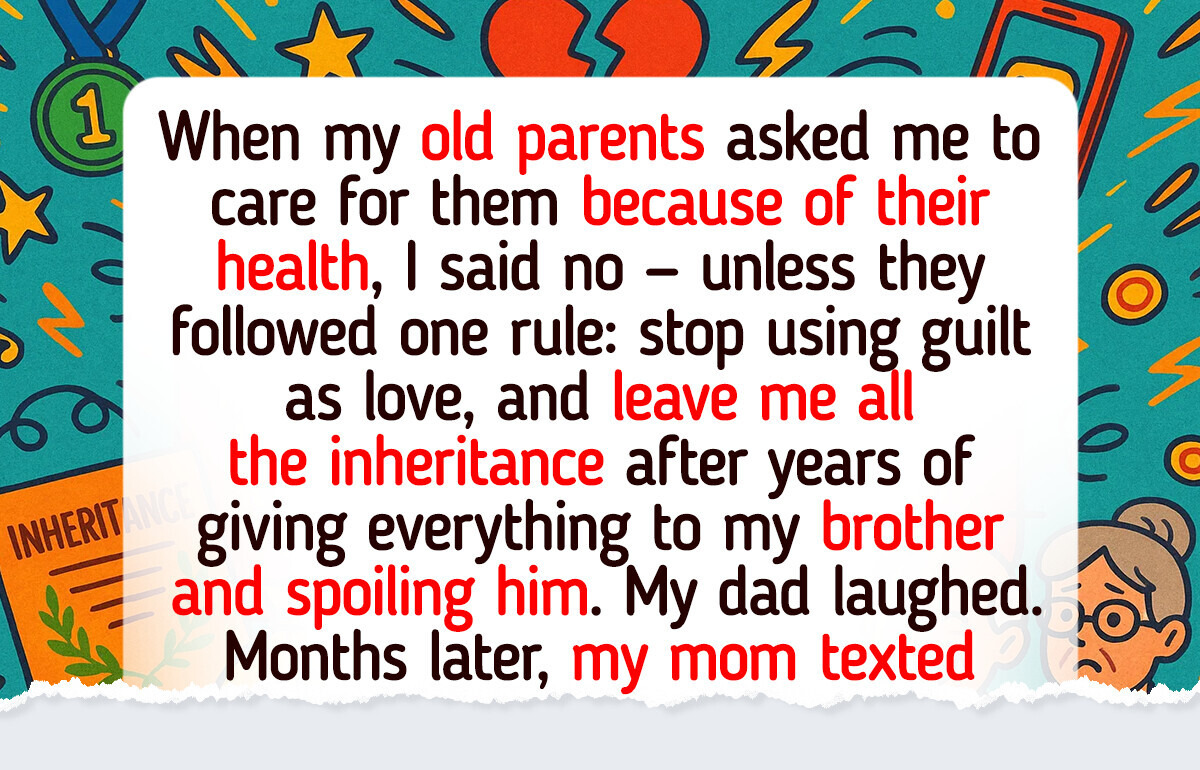
They aren’t just stories — they’re confessions, filled with years of love, resentment, guilt, and quiet courage. This one came from a woman named E., who shared a heartbreakingly honest message about family, boundaries, and what fairness really means. Her story reminds us that sometimes, saying no isn’t cold — it’s the only way to stay whole.
Hi dear Bright Side team!
When my parents got older, I became their backup plan — not because they trusted me, but because my brother refused. He was their favorite. I was just... reliable.
My parents always had a favorite — my brother.
They paid for his college, his house down payment, even bailed him out when he lost his job.
Me? I was “the independent one.” Translation: the one they never had to help.
When they got older and asked me to move in (because my brother refused) and care for them, I said no. Then I suggested:
“I’ll help,” I told them, “but only if you follow my one rule.”
My mom, “What rule?”
“No more guilt. And if you expect me to take care of you, you leave me everything. You’ve spent your whole life taking care of my brother — this time, you take care of me.”
My dad laughed and said, “So you want payment for being a daughter?”
I said, “No. I want fairness for being one.”
They didn’t call for months. I assumed that was it.
Then one day, my mom texted: “We updated the will.”
I didn’t move in, but I visited, helped when I could. They never brought up the deal again.
Sincerely,
E.
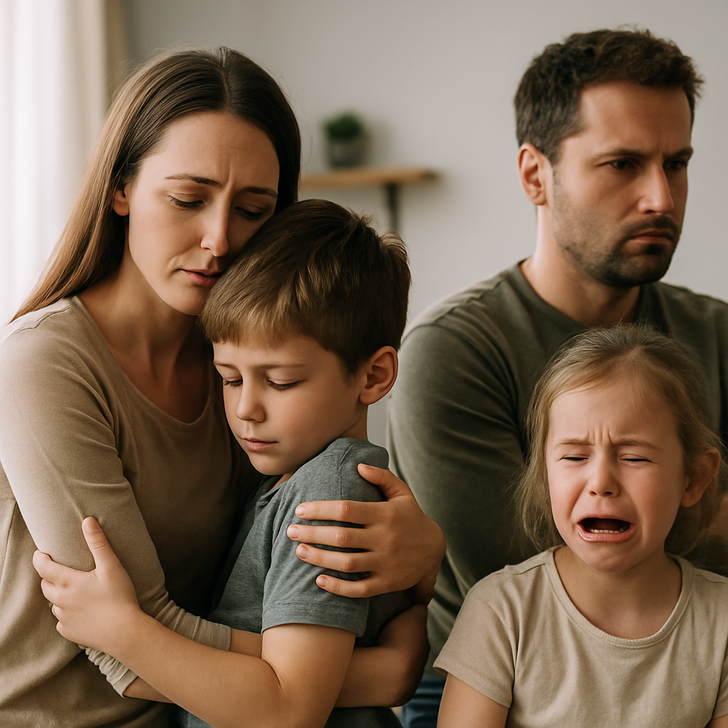
Long-Term Effects of Parental Favoritism: Why “Mom’s Favorite” Isn’t Just a Joke
Siblings love to tease each other about being “Mom’s favorite” — but according to a study in the Journal of Marriage and Family, it’s no laughing matter.
About 70% of mothers admit to having a favorite child. That might sound harmless, but experts say it can shape who we become — and how we love — long after childhood ends.
💛 What Does Parental Favoritism Look Like?
It’s not always obvious. Maybe your sister always got the bigger slice of cake. Or your brother never got grounded, no matter what.
Favoritism is when one or both parents consistently treat one child better — more attention, more leniency, or more praise.
Most parents don’t mean to do it. Sometimes it’s because one child reminds them of themselves, or because the youngest needs more care. But even when unintentional, the message lands: someone’s love is easier to earn.
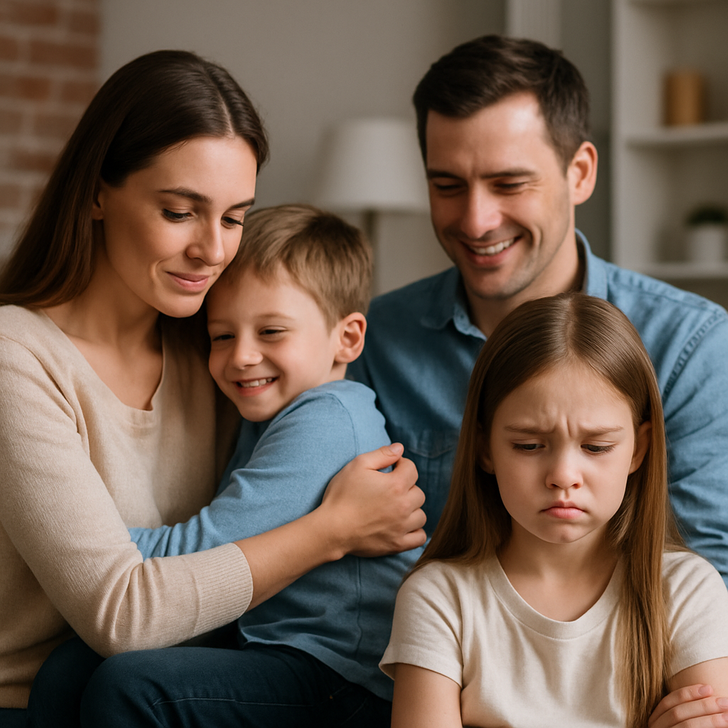
💔 Why Parents Play Favorites
The oldest might get special treatment because they were the first “everything.” The baby might be spoiled because they’re still “the baby.” And sometimes, parents spend more time with a child who’s sick or struggling — not out of preference, but protection.
Still, even the most well-meaning parents can send a message that hurts: love has conditions.
🧠 What It Does to Children Long-Term
Therapist Mallory Williams, LCSW, says favoritism can echo for decades.
Children who feel less loved often grow up battling anxiety, low self-esteem, and depression. They may struggle in jobs or relationships, constantly trying to earn affection or approval.
“The non-favored child often feels they can never be worthy enough,” Williams explains. “That can lead to giving up — or growing up believing love always comes with competition.”
On the flip side, being the favorite isn’t a free pass either. Those kids often feel pressure to be perfect, terrified to disappoint. They may struggle with failure — or become distant from their siblings, who resent them for something they never chose.
🧍♀️ What Happens When Everyone Grows Up
You’d think parents would grow out of playing favorites, but research shows the opposite.
Even in adulthood, many parents lean toward the child who lives nearby, helps financially, or simply checks in more.
Only 15% of adults in one study said their mothers treated them equally. The rest? Still felt the sting of unequal love — and higher levels of depression.
🌱 What Parents Can Do
The good news? Awareness changes everything.
No parent is perfect — but noticing small differences helps stop favoritism before it becomes a pattern.
Here’s what Williams suggests:
Give equal praise when it’s deserved.
Spend one-on-one time with each child.
Avoid comparing siblings — even “harmlessly.”
Reflect on your own childhood. Did favoritism shape you too?
Because while every parent slips up, the best ones recognize it — and choose to make things right.
In the end, favoritism doesn’t just shape childhood — it shapes connection.
And sometimes, the most powerful thing a parent can say to a child is, “I see you, too.”
I Refuse to Let My Sister Step Inside the Home I Bought for Our Parents — and I’m Not Sorry
Comments
They updated the will, are you sure? Did they even give proof?
Related Reads
12 Stories That Prove Real Kindness Is About Actions, Not Words
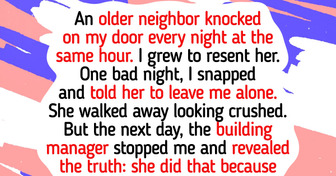
I Was Excluded From a Family Trip to Satisfy My Stepson—My Payback Hit Them Hard
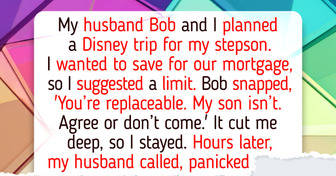
I Refused to Let My Toxic MIL Move In—Now My Husband’s Family Says I’m Ruining Their Lives
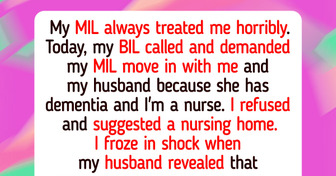
12 Small Acts of Kindness That Quietly Changed Lives
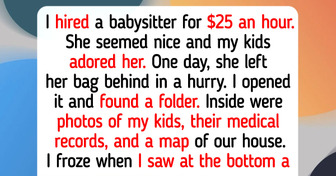
I Refuse to Babysit My Stepson Just Because I Work From Home
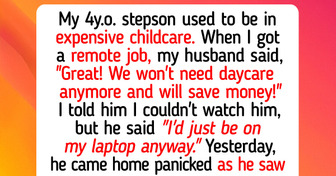
I Refuse to Care for My Daughter’s Baby, I’m Not a Free Childcare Center
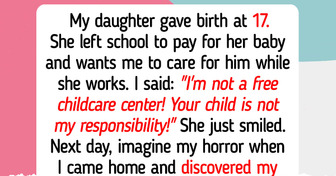
15 Moments That Remind Us Kindness Isn’t Weakness, It’s Quiet Survival
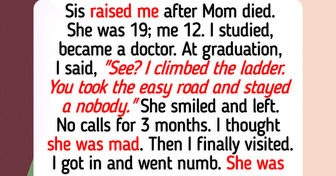
Our “Romantic” Vacation Was Hijacked by My Wife’s Family—And It Forced Us to Reevaluate Our Relationship
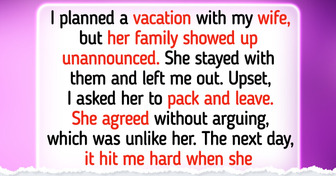
I Refuse to Take Care of My Sick DIL, I’m Not Her Full-Time Nurse
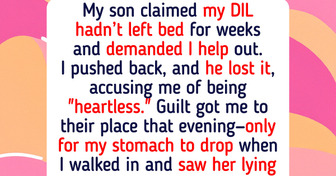
11 Touching Stories of Kind Strangers Who Became Someone’s Light
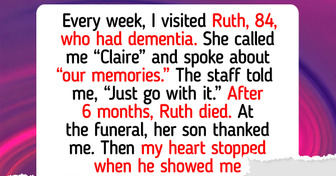
I Kicked Out My Sister and Her Son After His Behavior Crossed a Line
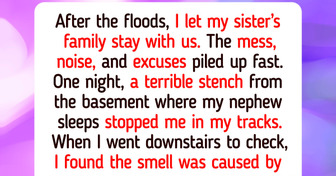
15 Stories That Prove Some People Live in a World With Totally Different Logic
